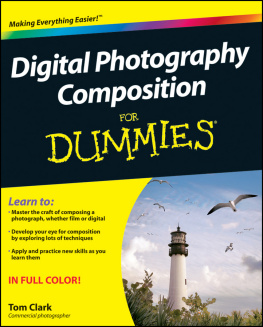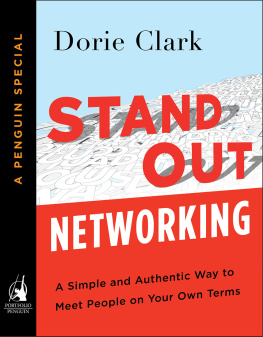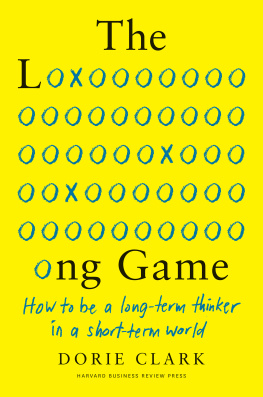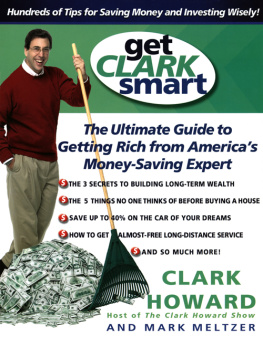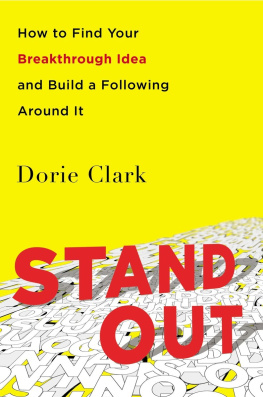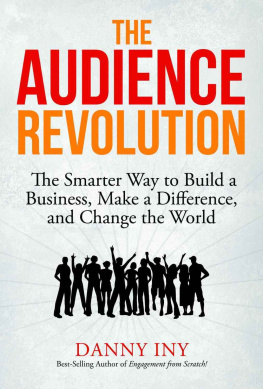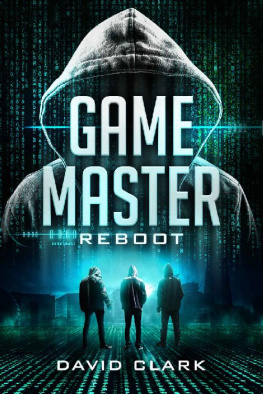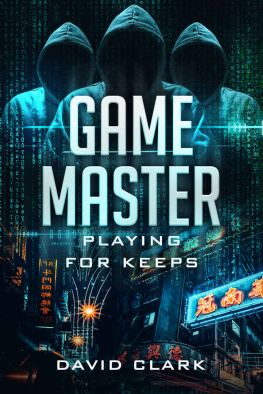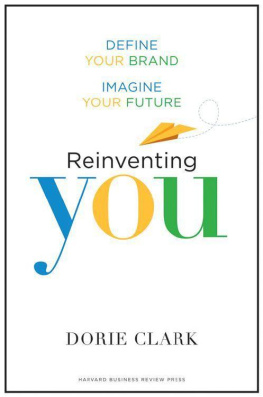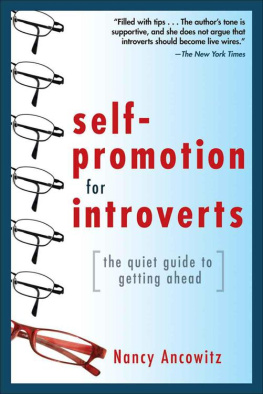USA | Canada | UK | Ireland | Australia | New Zealand | India | South Africa | China
First published by Portfolio / Penguin, an imprint of Penguin Publishing Group, a division of Penguin Random House LLC, 2015
Penguin supports copyright. Copyright fuels creativity, encourages diverse voices, promotes free speech, and creates a vibrant culture. Thank you for buying an authorized edition of this book and for complying with copyright laws by not reproducing, scanning, or distributing any part of it in any form without permission. You are supporting writers and allowing Penguin to continue to publish books for every reader.
Clark, Dorie.
Stand out : how to find your breakthrough idea and build a following around it / Dorie Clark.
Includes bibliographical references and index.
1. Creative ability in business. 2. Career development. 3. Success in business. I. Title.
Introduction
You have something to say to the world. You have a contribution to make. Each of us has ideas that can reshape the world, in large ways or small. It might be developing a new business process, creating a new literary movement, or finding a new way to deliver humanitarian aid. It could be changing how the world looks at a political cause, or how students are taught, or how the corporate world should handle work-life balance. Whatever your issue, if you really want to make an impact, its important for your voice to be heard.
Yet too many of us shrink back when it comes to finding and sharing our ideas with the world. We assume the leading experts must have some unique talent or insight. We assume that our own ideas may not measure up. We assume that working hard and keeping our heads down will be enough to move our careers forward. But none of those things is true. Most recognized experts achieved success not because of some special genius, but because they learned how to put disparate elements together and present ideas in a new and meaningful way. Thats a skill anyonewith hard workcan practice and learn. And more and more, its essential. In todays competitive economy, its not enough to simply do your job well. Developing a reputation as an expert in your field attracts people who want to hire you, do business with you and your company, and spread your ideas. Its the ultimate form of career insurance.
Its overstating the case to claim that theres a surefire formula for becoming a recognized authority in your field. But are there patterns? A common set of principles that almost every respected leader follows, consciously or unconsciously? Without a doubt. With hard work and smarts, almost any professional could become a thought leader in his or her company or field. Few ever tryand thats your competitive advantage. If youre willing to take the risk of sharing yourself and your ideas with the world, youre far ahead of the majority, who stay silent.
You were meant to make an impact. Now is the time to start.
BECOMING A RECOGNIZED EXPERT
Lets get clear on definitions. In this book, Ill be talking about how to become a recognized experta thought leaderin your field. First, if you are a thought leader, youre known for your ideas. If you have celebrity without intellectual content backing it up, you might as well be a reality TV star. Kim Kardashian, whatever her other virtues, is not a thought leader. Second, you must have followers in order to be a thought leader. Being an expert is great, but its not sufficientit merely implies you know what youre doing. Thought leaders strive to make an impact, and that requires them to get outside the ivory tower and ensure that their message is accessible and actionable. Its also important to note that you dont need to be the worlds leading authority on a subject; you can be a thought leader in your company or in your community as well.
Recently theres been some cultural blowback about the concept of thought leadership itself (a term coined in 1994 by Joel Kurtzman, then the editor in chief of Strategy + Business magazine, regarding thinkers whose ideas merited attention
The underlying assumption seems to be that aspiring to the creation of new and important ideas is somehow sleazy, or a form of strategic puffery. Admittedly, some advice on thought leadership is vapid and banal, just as some advice on marketing, or strategy, or finance can be. But sharing your ideas with the worldwhen done rightis a far more meaningful act. Often, it looks like bravery.
When Diane Mulcahy was hired by the $2 billion Kauffman Foundation to manage its private equity and venture capital portfolio, she realized something was wrong. The foundation had invested in more than one hundred VC funds over two decades, but as a former venture capitalist, she realized the returns were far less than they theoretically should have been. Figuring out what was going wrong was important for the foundations finances, but also for its mission. If venture capital was broken, the Kauffman Foundationwhich focuses intensively on supporting entrepreneurshipneeded to understand why.
Mulcahy began investigating, and the numbers werent pretty. Venture capital has had poor returns for over a decade, and the analysis we did on our own portfolio showed VC returns had not beaten the public markets, which is a terrible thing to have to say, she recalls. Venture capital promises to beat the public indexes by a fairly high marginthats the only reason youd invest in a private partnership that ties up your money for a decade and charges high fees. It was a very big deal to come out and say, with a lot of data to back it up, that venture capital doesnt deliver on its promises.
Mulcahys report didnt name names or criticize specific VC firms. But it laid bare Kauffmans own investment portfolio, a striking move in an industry thats generally opaque. She took on the sacred cows of the industry, highlighting the overly generous terms VC firms negotiate for themselves. VCs go around talking about what great investors they are, she says, but in actuality, theyre paid on fees regardless of how good an investor they are. Indeed, VCs running a $1 billion fund make $20 million a year from fees, even before a single investment is made.
She started facing resistance even before the report was published. I had at least a handful of people say to me during interviews, Diane, why are you doing this? Youll never work in this industry again. Some people said it in a genuinely personal, caring way, and others said it in a mildly threatening way. There was a sense that if youre going to write things like this, reports that are provocative and go against the accepted narrative, your career in this industry is over.
Once the report was released, the firestorm intensified. Her report was widely discussed by industry blogs and in the news media, but it didnt make Kauffman, or Mulcahy, popular in some quarters. Some asked why they were killing venture capital or trying to make it harder for entrepreneurs to make money. Others questioned whether Kauffmans poor returns were the result of flaws in the venture capital system, or just its own bad investment decisions.




